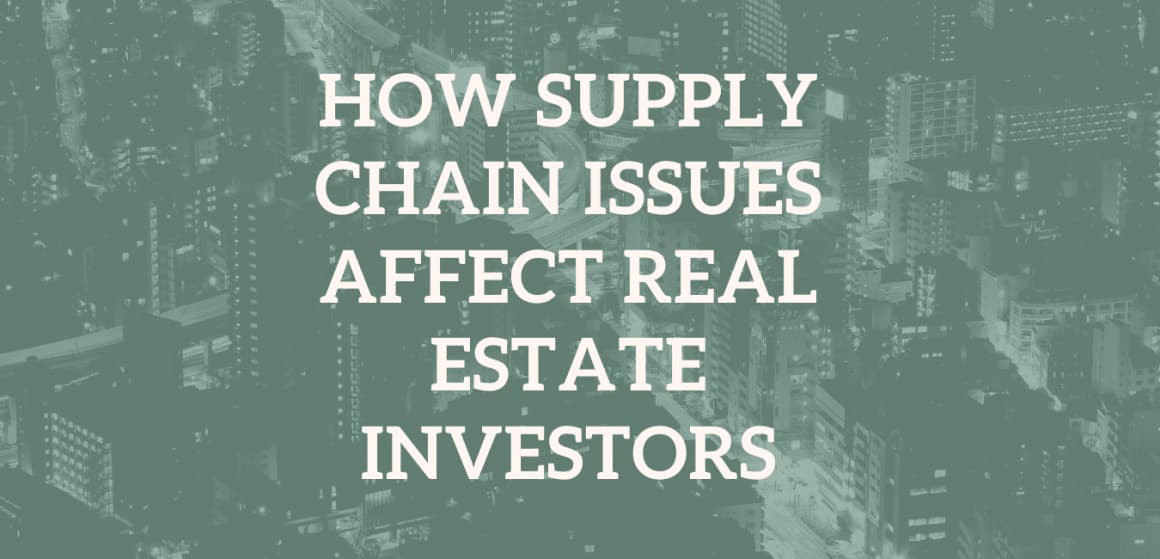Most real estate investments have almost been a “can’t miss” strategy over the past five years. but as we move forward, investors will need to navigate through challenges that many have not faced in the past.
One of the issues that have an invisible impact on real estate values is the supply chain. Existing supply chain shortages and uncertainty about future supply chain stability have had a significant impact on present real estate prices.
In this article, we want to explore some of the linkages between the supply chain and real estate values. What sectors are hit the hardest by supply chain issues? What are some considerations related to real estate investing and the supply chain?
BREAKING DOWN “Supply Chain”
The supply chain is comprised of all the series of processes by which raw materials are converted into finished products and services and then delivered to point-of-consumption customers. The core of the supply chain is made up of purchasing, manufacturing, distribution, and logistics.
While many of the core materials and inputs necessary for the economy come from within the US, the nation is also heavily dependent on China, Japan, Europe, and Southeast Asia for core manufactured materials.
A disruption in Chinese production can have a ripple effect on supply availability in the US and other nations.
Due to the pandemic and environmental concerns, China has implemented a power rationing scheme in its various provinces. This reduced power availability, due to targets for coal burning reductions, has caused a decrease in production by up to 33%. Many analysts predict these reductions will result in pent-up demand for 2022, which will further impact supply chain issues.
In an interconnected global economy, Chinese production levels have significant effects on everything from the price of steel to the availability of things like countertops and low-cost finishes.
Supply Chain Connection To Real Estate
The supply chain can factor into real estate investment in several ways.
- Extended Timelines
For example, when there is a shortage in critical components of the supply chain, it increases prices and extends project timelines. Both of these factors can have material effects on return projections on any pro forma.
Extended timelines also add more exposure to underlying financial market changes. Conditions, for example, in the refinance space could change during the extension of a project. With many projects, the extended timeline could open up opportunistic refinancing opportunities or threaten negative resale conditions if commercial mortgage rates.
Project delays also cause issues with contractors and skilled laborers. Many need a constant input of jobs to keep the lights on in their businesses. With delays and developers responding to increased prices for key inputs, many skilled laborers pivot or change geography causing issues with key project personnel.
- Price Increases
Supply chain issues also create problems for projects focused on ground-up developments, re-developments, or value-add properties.
Fluctuations in lumber prices, for example, can create dramatic changes in build or re-development costs. As developers create projections based on certain commodity prices, the potential for significant swings in costs can be a source of risk.
- Underlying Tenant Strength
The supply chain woes also affect tenant strength in the retail sector. Strip malls and other retail space owners will find themselves working together with tenants to maintain revenues and lease payments. For those tenants adversely affected by the supply chain, this can lead to early terminations and a higher frequency of tenant turnover.
Real Estate Sectors Most Affected by the Supply Chain
While no one sector is immune, supply chain issues can have greater impacts on some sectors than others.
- Retail Space
The retail sector has high exposure to the supply chain. Retailers can be impacted by significant changes in any single element of the supply chain, leading to a dramatic impact on the retailer. With weakened retailers, building owners can find themselves struggling to collect lease payments.
Many retail space owners will have to work together with retailers, as in the pandemic, to maintain common revenue and ensure the strength of the overall asset base.
- Industrial Space
The supply chain can also impact industrial real estate. Manufacturers and distributors of goods can be heavily affected by shortages of key supplies such as steel, cotton, and pulp metals. Their ability to produce products for distribution can be hampered or completely stopped if they cannot get the materials necessary for production.
- Auto Dealers
Auto dealerships are also sensitive to changes in the supply chain. As new model production typically ramps up, the market for used cars also increases. This can create a ripple effect that impacts both parts suppliers and consumers alike.
- New Build and Value-add/Re-development Investors
New build and re-development projects can also see issues similar to those in the retail and industrial sectors. These projects may face issues related to purchase price, build costs, and rents which can vary due to any number of factors including the availability of skilled laborers, material shortages, weather conditions, or increased commodity prices.
Impact on Real Estate Investors
In all cases, it’s best to err on the side of caution when making projections that factor in an extended recovery period. And — if you’re seeing red flags that point toward outsourcing or subcontracting issues — address them quickly with your partners to take action before it’s too late.
Entering projects with high reserves and conservative projections will help prevent any potential financial scares and the resulting damage that comes from a supply chain surprise. Savvy developers will also be able to capitalize on “war chest” money to make smart purchases of bulk inputs.
The bottom line is that now more than ever it’s important for owners and managers to have a firm grasp on key aspects of their portfolio that are impacted by supply chain issues. The ability for executives within real estate companies to track changes in the supply chain will become even more valuable as we move through 2022.







